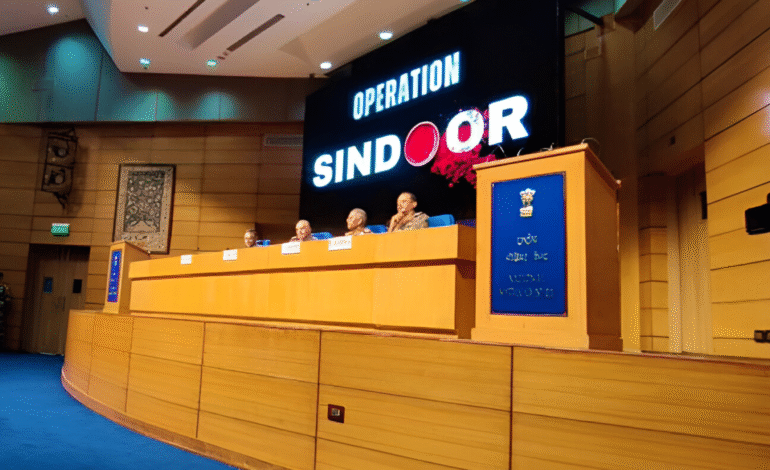India Warns Pakistan of Punitive Response to Ceasefire Breach

India and Pakistan recently agreed to halt all forms of hostilities across land, air, and sea from 5 PM Indian Standard Time. The agreement, a significant diplomatic step, was aimed at de-escalating long-standing tensions along the borders. However, just hours after the announcement, the agreement was put to a severe test. Reports surfaced of Pakistani drones intruding into multiple Indian territories, including sensitive regions in Jammu, Punjab, Gujarat, and Rajasthan. The sudden breach led to widespread power outages, prompting heightened security measures.
This sequence of events quickly reignited concerns over the reliability of ceasefire commitments. What was meant to be a turning point in regional peace turned into a tense military standoff. The Indian Armed Forces, in response, issued a strong warning emphasizing that any further provocation would invite a forceful and punitive reply.
Military Leadership Addresses the Nation with Strong Assurance
On Sunday, May 11, senior representatives from the Indian Army, Navy, and Air Force jointly addressed the press. The most notable comments came from Lieutenant General Rajiv Ghai, Director General of Military Operations (DGMO), who clarified India’s stance. According to Lt Gen Ghai, the Indian Armed Forces remain on high alert, prepared for all contingencies. He stressed that although an understanding was reached, the events that followed necessitate a serious response.
Lt Gen Ghai addressed the question of Pakistan’s rationale behind the ceasefire breach but refrained from speculating, stating it is a matter best explained by the Pakistani side. However, he made it clear that India would not remain passive. Any further aggression, especially involving airspace violations and drone activity, would be met with a fierce and proportionate military response.
India’s Emphasis on Sovereignty and Preparedness
During the briefing, Lt Gen Ghai reiterated that the ceasefire agreement does not equate to relaxed vigilance. On the contrary, the Indian Armed Forces are more alert than ever. He emphasized that the mandate of the military is to ensure the safety of the nation’s sovereignty, territorial integrity, and the protection of its citizens.
“Preparedness is not seasonal,” Lt Gen Ghai explained. “It is continuous. Whether or not a ceasefire is in place, the Armed Forces remain prepared to meet any challenge. Our response will be calibrated and measured, but it will also be fierce and punitive if circumstances demand.”
These remarks underline India’s intent not to provoke but to remain resolute in its defensive capabilities. The message was one of strength backed by discipline rather than aggression for its own sake.
Ceasefire Violations and Security Protocols Across Borders
Following the ceasefire violation reports, various parts of northern and western India experienced precautionary blackouts, especially in border towns. These were enforced as security measures in response to the drone intrusions. Cities in Jammu and Kashmir, parts of Punjab, and select regions of Gujarat and Rajasthan were affected.
These intrusions and resultant blackouts underline the fragile nature of cross-border peace. Drone activity, in particular, has emerged as a growing concern, challenging traditional defense mechanisms. The Armed Forces have responded by deploying advanced surveillance systems and quick response teams to ensure readiness in case of further incursions.
Even though no physical damage was reported due to the drone activity, the psychological and strategic implications of the violations were substantial. The Indian Armed Forces are closely monitoring developments and reviewing operational strategies accordingly.
Political Dimensions Avoided in Military Statements
Lt Gen Rajiv Ghai was clear about keeping the conversation focused on security, strategy, and preparedness. He refused to speculate on political intentions or motives behind Pakistan’s actions, underlining that such interpretations were beyond his mandate.
Instead, the focus was placed squarely on India’s actions and preparations. “What Pakistan does or intends to do is not my primary concern,” he said. “What we do, how we respond, and how we protect our country—that is what we are focused on.”
This distinction is critical in maintaining a professional military posture in volatile scenarios. It avoids unnecessary political entanglements and allows defense strategies to proceed without speculative distractions.
A Tactical But Measured Approach from the Armed Forces
Although the language used by Lt Gen Ghai was assertive, it was also carefully balanced. He noted that the Indian response had so far been “measured, non-escalatory, and calibrated.” This suggests that while India is fully capable of retaliating strongly, the approach will not be one of automatic escalation. Instead, each action will be determined by strategy and necessity.
India’s military leadership appears to be taking a long-term view of the situation. While the immediate response remains one of firm readiness, the broader emphasis is on stability and peace through strength, not through provocation. Lt Gen Ghai’s repeated reference to discipline, planning, and methodical execution reflects a structured command philosophy.
Future Military Posture and Strategic Readiness
The Indian Armed Forces’ leadership made it clear that they are not operating in an ad-hoc manner. Every step is part of a broader strategic framework. Lt Gen Ghai’s statements alluded to a clear roadmap already in place, covering scenarios ranging from routine monitoring to full-scale contingency management.
The leadership assured the public and the media that India is fully capable of responding to any military challenge while maintaining the principles of restraint and responsible defense. With commanders from the Army, Navy, and Air Force jointly addressing the issue, the message was one of unity and collective responsibility.
Moreover, it reflects a holistic approach to modern conflict scenarios where threats are no longer confined to a single domain—land, sea, or air—but often manifest as hybrid challenges involving cyber elements, drones, and proxy tactics.
Stability Remains the Priority Despite Rising Tensions
Despite the provocations, India’s official line continues to avoid inflammatory rhetoric. The goal remains maintaining peace while safeguarding national security. The Armed Forces’ statements reinforce that stability in the region is best achieved through adherence to agreements and mutual respect for sovereign boundaries.
While the immediate future remains uncertain, especially given the history of fluctuating India-Pakistan relations, the overall tone from the Indian side remains focused on control and clarity. There is no indication of knee-jerk reactions or impulsive maneuvers.
Lt Gen Ghai’s deliberate language and measured statements highlight a command structure that prioritizes reasoned judgment over reactionary tactics. This approach may well influence the tone of future engagements and encourage both sides to take diplomatic pathways more seriously.
Preparedness and Prudence Shape India’s Current Response
The press conference served not just as a warning but as a reassurance to the public. It emphasized that India’s Armed Forces are prepared for every eventuality, not out of choice, but necessity. The ceasefire, while desirable, does not change the realities of defense obligations.
In summing up the current posture, India’s military message was clear: diplomacy may shape policies, but defense ensures survival. The path forward, according to the statements given, will be guided by tactical responsibility, operational readiness, and the unyielding commitment to national sovereignty.
Even as regional dynamics evolve, the emphasis remains on a secure and calculated approach. India’s leadership, through its military voices, has clarified that while the hope for peace endures, any threat to that peace will be met with a firm and strategic response.







